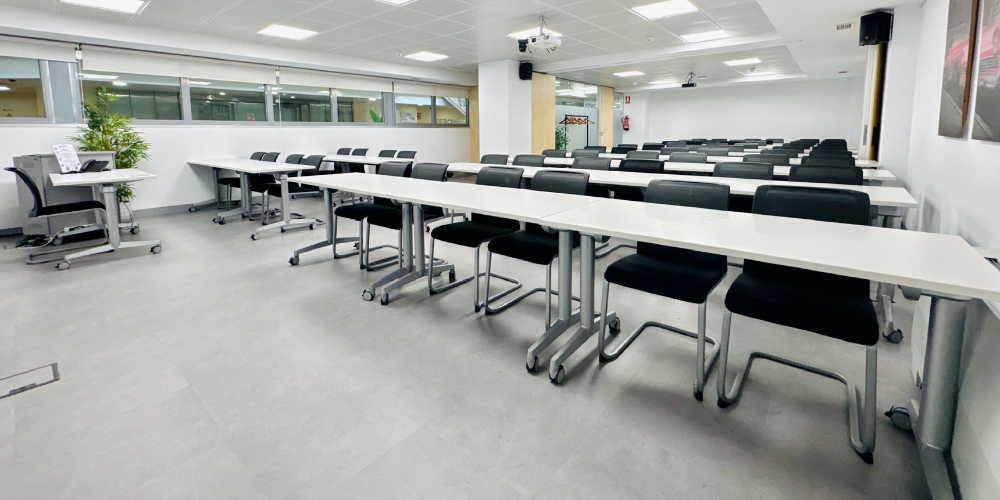In the last decade, we have witnessed a profound shift in work and business dynamics that has changed traditional work structures. If we go back in time, offices were conceived as those large, enclosed spaces, divided by cubicles and boardrooms, where interaction was limited to brief moments at the coffee machine or formal meetings.
However, in a scenario that seemed to be straight out of a science fiction novel, coworking burst onto the scene, bringing with it a revolution that few anticipated but many have been able to take advantage of.
But what exactly is coworking and why has it gained such prominence? At first glance, it could be described as the act of sharing a workspace with other professionals, but it is much more than that. It is the manifestation of a paradigm shift in the way we understand work, collaboration and professional networking. It reflects an era that values flexibility, diversity and synergy. It is the cry for freedom from entrepreneurs, freelancers and companies looking to break with convention and explore new ways of growing and interacting.
For entrepreneurs, coworking has been a real lifeline. It has given them access to professional workspaces without the need to invest in expensive infrastructures. Moreover, by immersing themselves in environments full of professionals from different areas, they have found opportunities for collaboration, learning and networking that would have been unthinkable in a traditional office.
The office market, for its part, has had to adapt to this new demand. Large office towers, which used to be rented to a single company, are now divided into smaller, more dynamic spaces adapted to the needs of this new worker profile. Long-term leases have allowed more flexible contracts, and added services such as meeting rooms, breakout areas or even event spaces have become the norm rather than the exception.
This article seeks to immerse you in the fascinating world of coworking, explore its influence on today’s business landscape, and unravel the reasons for its unstoppable rise. Get ready to discover how this phenomenon has redefined the rules of the game in the world of work and business, and how it could influence the future of how we work and collaborate.
What is coworking?
Coworking, literally translated as “working together” or “collaborative work”, refers to a way of working that allows professionals from different areas to share the same physical space to carry out their activities. However, beyond its literal definition, coworking represents a movement, a philosophy and a new way of understanding work in the 21st century.
Originated in response to the growing demand for flexible and accessible spaces for freelancers, entrepreneurs and startups, coworking has evolved to become an ecosystem rich in collaboration, exchange of ideas and networking. These spaces not only offer infrastructure (such as desks, meeting rooms or internet connection), but also provide an atmosphere conducive to creation, innovation and professional development.
One of the main characteristics of coworking is its inclusive and diverse nature. Designers, programmers, writers, lawyers and many other professionals can live together in the same space, which encourages interdisciplinary exchange and the creation of synergies between different fields of expertise.
But coworking is not just about sharing physical space. It is also about community. Coworking spaces often organise events, workshops and activities that aim to strengthen professional ties, promote continuous learning and generate business opportunities among their members.
In essence, coworking is a reflection of the transformation of the world of work. In an era where technology allows us to work from anywhere, where flexibility and adaptability have become essential, and where teamwork and interdisciplinary collaboration are key to innovation, coworking emerges as a solution perfectly aligned to the needs and challenges of the modern professional.

Main advantages of coworking
Coworking has experienced exponential growth in recent years, and this is no coincidence. This modality of work offers a series of benefits that are highly attractive to professionals from different fields. Below, we detail some of the most outstanding ones:
- Flexibility: Coworking spaces usually offer flexible contracts that adapt to the needs of each professional or company. Whether for hours, days or months, these spaces can be rented according to demand, without the need for a long-term commitment as in a traditional office rental.
- Cost reduction: Renting your own office implies not only the cost of rent, but also the cost of services, maintenance, furniture and other associated expenses. In a coworking space, all these costs are included in the fee, which allows for significant savings, especially for freelancers and startups.
- Networking Opportunities: By sharing space with professionals from different disciplines, the opportunities for networking, collaborating on projects and expanding your network are immense. This environment fosters organic collaboration and the exchange of ideas.
- Access to Resources and Tools: Many coworking spaces are equipped with state-of-the-art technology, meeting rooms, breakout areas, kitchens and, in some cases, even specialised equipment and software, all included in the cost of rent.
- Inspiring Environment: Being surrounded by motivated, entrepreneurial and creative people can be a significant boost to productivity and innovation. The design of many coworking spaces also prioritises comfort and wellbeing, which contributes to a more pleasant working environment.
- Geographic Flexibility: For those who travel frequently, the growing network of coworking spaces around the world makes it possible to have a workplace in almost any city, facilitating remote work and mobility.
- Professional Development: Many coworking spaces organise workshops, talks and events for their members, offering ongoing learning and professional development opportunities.
- Sense of Community: Unlike working alone from home, coworking offers a sense of belonging to a community. This can be crucial for mental and emotional well-being, especially for freelancers and entrepreneurs who tend to work alone.
- Security and Maintenance: Security concerns, cleanliness and maintenance of the workspace are the responsibility of the coworking provider, allowing professionals to focus entirely on their work.
- Customisation: Although coworking spaces are shared, many offer the possibility to customise the work area, allowing each professional or team to have a space adapted to their needs.
In short, coworking not only responds to the logistical needs of the modern working world but also offers an environment rich in opportunities and resources that enhance the growth and development of professionals who opt for this modality. It is a comprehensive value proposition that goes beyond a simple desk in a shared space.
What are the current trends in the coworking market?
The constantly evolving coworking universe is adapting and shaping itself according to the changing needs of the labour market and the demands of modern professionals. As coworking has established itself as a preferred option for many, a number of trends have emerged that are redefining the coworking landscape. Here are some of the most prominent:
– Specialised Spaces: Although initially coworking spaces were generalist, it is increasingly common to find spaces specialising in specific niches, such as technology, art, health or even gastronomy. These spaces offer tools, resources and an environment adapted to the particularities of each sector.
– Sustainability and Environmental Responsibility: In line with the growing concern for the environment, many coworking spaces are incorporating sustainable practices, from the use of renewable energy and recyclable materials, to the promotion of sustainable mobility among their members.
– Integrated Technology: Technology plays a key role in modern coworking spaces. From online booking systems to the integration of collaborative tools and the implementation of artificial intelligence solutions to enhance the user experience.
– Wellness and Wellbeing: Recognising the importance of wellbeing in productivity and creativity, many spaces are incorporating relaxation areas, gyms, meditation spaces and even massage and therapy services.
– User-Centred Design: The design of coworking spaces is evolving towards more user-friendly configurations, prioritising ergonomics, brightness, and the creation of environments that encourage both concentrated work and social interaction.
– Corporate Coworking: Large corporations are adopting the coworking model for their own employees, either through the creation of their own spaces or through partnerships with established providers. This trend reflects recognition of the value of coworking in promoting innovation and collaboration.
– Hybrid Spaces: Merging the coworking concept with other models, hybrid spaces are emerging that combine work areas with other functionalities, such as cafés, shops, art galleries or even accommodation.
– Virtual communities: As remote and digital working takes hold, many coworking spaces are developing virtual communities that offer online resources, events and networking opportunities for their members.
– Expansion to Less Urban Areas: While initially coworking was very much focused on large cities, demand is driving the opening of coworking spaces in suburban and rural areas, offering an alternative to those looking to get away from the hustle and bustle of the metropolis.
– Integration with the Local Ecosystem: Coworking spaces are looking for ways to integrate more closely with local communities, whether through co-working programmes, events open to the public or social impact initiatives.
These trends reflect a reality: coworking is no longer just a fad, but a genuine response to the needs of the contemporary workplace. And, as we look to the future, it is clear that these spaces will continue to evolve and adapt to the changing dynamics of work and society.
Relationships and collaborations born in coworking spaces
One of the greatest advantages and attractions of coworking spaces is the potential for the birth of relationships and collaborations. Working in a shared environment with professionals from different disciplines and areas fosters an exchange of ideas and perspectives that can lead to joint projects and strategic alliances. Let’s take a closer look at this phenomenon:
– Professional Diversity: The inclusive nature of coworking spaces allows a graphic designer, a software developer, a marketing expert and a lawyer, for example, to share the same space. This diversity can lead to the creation of multidisciplinary teams capable of tackling projects in a holistic manner.
– Organic Networking: Unlike traditional networking events, in coworking spaces, networking happens organically and on a daily basis. A simple conversation during a coffee break can become the start of a long-term collaboration.
– Mutual learning: Being exposed to professionals from different fields, it is common for members of a coworking space to learn from each other. A finance professional may learn basic design skills, while a writer may learn about SEO strategies, enriching his or her repertoire and skills.
– Joint projects: It is not uncommon that, by identifying synergies and complementarities, two or more members of a coworking space decide to join forces to carry out a joint project. These alliances can be temporary or give rise to companies and startups.
– Supportive Environment: Most coworking spaces foster a collaborative and mutually supportive environment. This atmosphere encourages a willingness to collaborate, share resources and help in times of difficulty or challenge.
– Events and Workshops: Many coworking spaces organise events, talks and workshops for their members. These events not only offer learning opportunities, but are also a great way to identify potential collaborators and partners.
– Access to New Markets: Through the relationships and collaborations born in these spaces, professionals can gain access to new markets or sectors that were previously out of reach. A technology startup, for example, could collaborate with a health expert and enter the digital health arena.
– Validation and feedback: Before launching a product or service to the market, it is invaluable to have the opinion and feedback of other professionals. Coworking spaces offer a community willing to test, give opinions and suggest improvements.
– References and Recommendations: A good relationship with other members of the coworking space can result in referrals and recommendations, expanding the network of contacts and potential clients.
– Culture of Sharing: In a coworking space, sharing goes beyond the physical space. Knowledge, experiences, contacts and opportunities are shared, creating an ecosystem enriched by collaboration.
In short, coworking spaces are breeding grounds for relationships and collaborations that can have a significant impact on the careers of their members. In a world where interdisciplinary collaboration is key to innovation, these spaces are positioned as facilitators of meaningful and productive connections.
Ibercenter as an iconic figure of coworking spaces in Madrid
Ibercenter is not just a coworking space, it is a reference in terms of collaborative and flexible workspaces in the heart of Madrid. With years of experience in the sector, Ibercenter has managed to combine the dynamism of coworking with a touch of professionalism and elegance that distinguishes it from other spaces.
One of the highlights of Ibercenter is undoubtedly its strategic location. Located in the centre of Madrid, it offers its users the advantage of being in one of the nerve centres of the capital, surrounded by a wide variety of services, restaurants, shops and leisure areas. This positioning not only facilitates access to members, but also allows them to receive clients and collaborators in a prestigious and well-communicated environment.
Ibercenter’s spaces are designed with the needs of modern professionals in mind. Spacious work areas, meeting rooms equipped with the latest technology, relaxation areas and, of course, a high-speed internet connection are just some of the services on offer. The interior design, with contemporary aesthetics and attention to detail, encourages creativity and productivity, allowing each professional to find their ideal space to develop their projects.
In short, Ibercenter offers a clear value proposition for professionals and companies looking for a high quality coworking space in Madrid. Its combination of strategic location, first-class facilities and vibrant community make Ibercenter the preferred choice for many in the Spanish capital.
Conclusion on the coworking phenomenon
Coworking is no longer an emerging trend but has become an essential part of the contemporary business and work fabric. This way of working, which was born as a response to the changing needs of society and the search for more flexible and collaborative spaces, has revolutionised the way we understand and live our day-to-day working lives.
What began as a solution for freelancers and entrepreneurs has evolved to be adopted by large corporations, reflecting the versatility and efficiency of the model. Coworking not only provides a physical space adapted to today’s demands, but also fosters an ecosystem of collaboration, mutual learning and professional and personal development.
Ibercenter, with its proposal in the heart of Madrid, is a clear example of how coworking spaces can adapt and offer concrete and high quality solutions to their users. Beyond a desk and a chair, places like Ibercenter offer a complete experience, enriching the working day with networking opportunities, access to new trends and, above all, the possibility of being part of a diverse and dynamic community.
In the current landscape, where flexibility, adaptability and collaboration are essential, coworking emerges not just as an option, but as a standard. The integration of technology, the constant search for wellbeing and the building of relationships and collaborations are just some of the characteristics that make coworking the future of work.
As we have explored throughout this article, the benefits of coworking are multiple and palpable. From fostering innovation to providing economical and flexible solutions, this modality promises to continue growing and adapting to the challenges that the new normal and the future of work present us with.
So, whether you’re an entrepreneur looking for your first space, an established company exploring new models, or simply a curious professional, the world of coworking has something valuable to offer you.
Business Center in Madrid – Flexible Offices in Madrid Ibercenter




